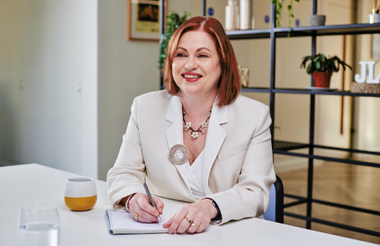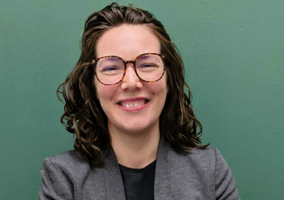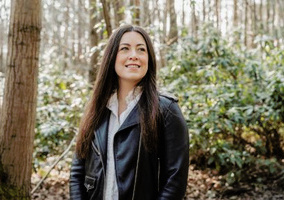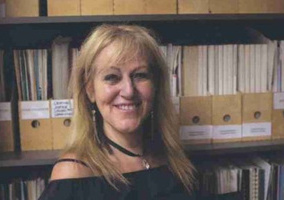Lynne Guyton grew up in a council house in Basildon, Essex, where politics was at the forefront of her family’s discussions.
Her parents and grandparents were “very politically motivated”, she says, read a newspaper and watched the news twice a day, while her father and grandfather were “strong trade unionists”.
That motivated her “to learn more about the system, views and system change and what’s possible”.
She became the first member of her family to go to university, obtaining a bachelor of arts in politics and a master’s degree and doctorate in economics.
While doing her PhD, she toyed with the idea of staying in academia but decided otherwise as money held heightened significance.
“I wanted to make sure that I wasn’t relying on parents, handouts or anything else,” she says.
“It was important for me to make my own way in the world. I went into financial services, with the goal of making money and making sure that I had financial security.”
From banking to charity
In the late 1990s, Guyton began a career in investment banking, working initially for Deutsche Bank before moving to other organisations including Accenture, Barclays Capital and the Royal Bank of Scotland (RBS).
As she began to be financially comfortable, she increasingly struggled to balance her long working hours with her young family. She describes the investment banking sector, and financial services more broadly, as “a very difficult environment if you’re a woman, particularly if you’re a woman with children”.
This combined with the pressures of the 2008 financial crash meant Guyton had “reached a point where I’d had enough” and decided to take a year off to consider her next move.
However, Guyton’s plans changed when her young son inadvertently helped her change the course of her career path. “My son said: ‘Mummy, I’ve seen something on the back of the Sunday Times.’ There was a job ad for the chief operating officer at the time of the Kew Foundation. ‘You love Kew, you could do that?’ I thought: ‘I’m not sure about that.’ But I had a look, went for it and got the role.”
Guyton remembers being warned by recruiters about the differences between the corporate and charitable sectors, but she disagreed.
“You’ve still got the same legal, human resources and audit things. All of these have to be professional and run exceptionally well,” she says.
“I told them: ‘Yes, culturally, there might be a difference.’ But technically, I wanted to bring the expertise I had in the commercial sector into the charitable sector, help where I was working and reap the benefit of my work.”
Not ‘patriarchal’ relationships
In 2017, Guyton was headhunted for her current role as chief executive of John Lyon’s Charity, which gives grants to benefit children and young people aged up to 25 who live in nine London boroughs.
The role immediately appealed to her. Her predecessor, the late Andrew Stebbings, had been with the charity since 1983 and was responsible for its formation in its current guise.
Guyton says inheriting a charity from a long-standing CEO meant she had “carte blanche” to change how it operated. One thing she aimed to grow was its campaigning work on behalf of young people.
“In the past, John Lyon’s Charity had been just a grant-giving charity and I wanted to make it more of a campaigning charity standing up on behalf of the grantees we support.
“In the first few years, I realised we’d a wealth of experience because we’re a place-based funder, but we weren’t utilising our knowledge for the benefit of our grantees. We weren’t giving them a platform to say: ‘This is what we need; this is what’s wrong; or actually, this is a better way of working.’”
Place-based funding
Guyton believes that being a place-based funder means her charity knows its grantees well and can deliver better outcomes for them.
For example, the charity visits grantees in person instead of just receiving applications and deciding based on the information provided.
“We go out and see what’s needed. Sometimes, we’ll say: ‘Actually, you’re not applying for enough funding. Have you thought about this?’ We’ll often try to help with their applications because we want them to succeed.
“Sometimes, that might take a year until they’ve got to the point where they’re ready to submit. And we don’t just go out that once. We try to see it as a partnership with our grantees, rather than a patriarchal relationship where we’re bestowing grants upon them.
“We’re doing it for the benefit of the community. We say: ‘You’re the community organisation, tell us what you need.’ We’ve tried to make grant conditions and reporting less onerous. I say to my trustees: ‘We need to trust our grantees because they’re on the ground and they’re the ones delivering.’”
‘Irresponsible and short-sighted’
Accounts for the financial year ending March 2024 show that John Lyon’s Charity paid grants of £15.9m towards work in areas such as education and learning and emotional wellbeing, an increase of 6% on 2022-23.
The accounts say 2023-24 “was very much a year of transition from the existing to the new strategy” and “while we’ve made difficult choices on where and how to fund, we were determined not to close any funds to new applications”.
In the last few years, several large and well-known funders have closed applications, changed their priorities or decided to spend down their funds.
Guyton calls such decisions “a huge mistake”, explaining: “Those that are spending down, I understand if you’ve got families who are still alive and want to see the funding spent down in their lifetime.
“But that’s not been the case for a number of the large charities that are spending down. It’s irresponsible and short-sighted. For those that are pausing their funding, I’m frustrated because it’s navel-gazing.
“We haven’t got the luxury to sit back and think: ‘What should our strategy be now for the next five years while we make all these grantees pause and not apply to us?’ We’ve learned to walk and chew gum at the same time, so why can’t other funders do that?”
In 2023, John Lyon’s Charity launched a five-year strategy, which sets out changes including increasing the maximum duration for its main grants from three to up to five years and increasing its main grant size from £30,000 to £40,000-£50,000 per annum.
It was important for Guyton not to close funding while coming up with a new strategy post-Covid-19 as it had “never been in more demand”.
She notes that as other funders close, John Lyon’s Charity sees a vast increase in applications, often speculative and from outside its area of operation. “It shows the desperation,” she says.
Legal challenge
Last September, John Lyon’s Charity initiated a legal challenge against the previous government’s plans for leasehold reforms introduced in November 2023.
The Leasehold and Freehold Reform Act 2024 received royal assent last May. It aims to strengthen leaseholders’ rights by, for instance, removing the requirement to pay a property’s “marriage value” – an increase in its value – to their freeholder when extending a lease.
As a freeholder, John Lyon’s Charity is concerned that the proposed end of marriage value could mean it loses out on millions of pounds in income each year.
Guyton explains that her charity owns several properties, with the original John Lyon estate going back nearly 500 years.
John Lyon was a farmer who in 1572 was granted a royal charter by Elizabeth I to found Harrow School. Six years later, he provided an endowment in the form of a 48-acre farm in the area now known as Maida Vale to a trust tasked with maintaining two roads between London and Harrow.
To this day, John Lyon’s Charity still owns “a lot of the land within St John’s Wood and over time, there have been very fancy, expensive houses” built there, Guyton says.
“We’re talking about the ones on Hamilton Terrace which are worth £5-6m plus. We have a mix of houses there. We’ve got houses that we own outright, so where we own the land that the property sits on and the property itself.
“The other parts of the land we own in St John’s Wood are where there are leasehold properties. That’s where we own the land that a property sits on but not the property itself. It means we can charge ground rent.”
Guyton says the charity does not charge large ground rents but makes money through marriage value, as tenants extend their properties’ leasehold.
She estimates that in the past, this premium has been worth between £6m and £10m a year compared with around £3m now. This compares to the charity’s overall income of just under £11m in 2023-24.
Guyton argues that her charity should receive an exemption – as the Crown Estate, National Trust and Duchies of Lancaster and Cornwall have – as it does not make profits and is not a landed estate.
“We happen to be a charity that historically got land, but use all of that to either plough money into the endowment or our grantmaking.
“St John’s Wood isn’t a poor area. Many of the people living there are non-doms, so if this legislation comes into being, this money will be a transfer of wealth from a London-based charity to many who are non-doms in the UK.”
Guyton says her charity has been successful in its legal challenge to date, winning both the September preliminary hearing and a formal first hearing in January. However, the final hearing is due to take place in July.
“At the moment, we have leaseholders on our estate who are holding back. They’re not extending their leases because they’re deliberately waiting for this legislation to come into force, so we’re losing money.
“If this continues, and if we lose, we’ll have to revisit our strategy and grant-giving strategy as a consequence.”












